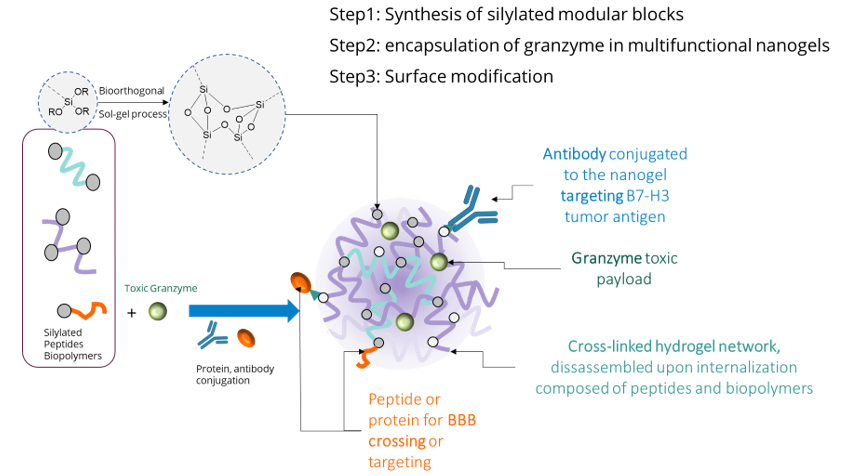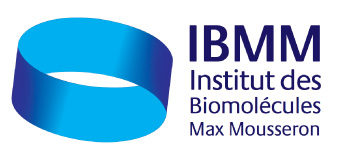PhD offer : personalised nanomedicines to target brain cancer
PhD position
Personalised nanomedicines to target brain cancer
Period:
2026 – 2028
How to apply:
Send CV, Motivation Letters, recommendation letters and master track record on University of Montpellier platform (https://umontpellier.nous-recrutons.fr/poste/46frpfze1w-doctorant-etb-fh/)
Contact:
Locations:
IBMM, Pole Chimie Balard, Montpellier, Peptides www.ibmmpeptide.com and Utrecht university, Department of Pathology, University Medical Centre Utrecht www.bovenschenlab.com
The chemistry work will take place mainly at the IBMM in Montpellier with some short stays in Utrecht for biomaterial evaluation.
Summary
Medulloblastoma is the most common paediatric brain cancer, typically diagnosed around age 5. Current treatments include surgery, radiation, and chemotherapy, but these methods often prove ineffective, with high mortality rates or causing severe long-term side effects in survivors.1 Unfortunately, classical immunotherapies that block tumour immune checkpoints – proteins like PDL1 and B7-H3, are not efficient on such tumours with limited immune infiltrate and a multitude mechanism of resistance. Among the possible ways to trigger cell death, granzymes are an interesting choice to bypass the tumour’s immune evasion tactics. Granzymes2 are a family of five serine proteases released by immune cells along with cell penetrating peptides to cleave intracellular targets triggering apoptosis. Unfortunately, immune cells cannot reach efficiently this type of ‘cold immune’ tumors.
Adding to the complexity, a major challenge arises in effectively transporting therapeutics through the blood-brain barrier. Thus, there is a need for innovative therapies able to tackle all these challenges.
Nanogels are nanosized hydrogels networks which may encapsulate therapeutics to be delivered to specific tissues or cells thanks to surface modifications. Moreover, they could cross the blood-brain barrier through several mechanisms including transcytosis.

Herein, we propose to develop a novel class of personalised nanomedicines to target medulloblastoma and potentially other brain tumors relying on a modular approach using silylated building blocks assembled though biorthogonal sol-gel chemistry. Nanogels with a size of about 100 nm will be prepared by water-in-oil emulsion from various biopolymers compositions (e.g. hyaluronic acid, gelatine and dextrin). (i) Their degradability and swelling will be tuned by introducing reduction or enzyme-sensitive linkers and by controlling the degree of silylation within biopolymers3. (ii) Silylated charged amino acids (e.g. Arg, Ne-trimethyl lysine) will be introduced to control the isoelectric point of the network, favouring noncovalent interaction with their cargo. (iii) Silylated His residues or His-rich peptides could be used to trigger endosomal escape of the nanogels by proton sponge effect.4 (iv) Toxic payload will be encapsulated after or during nanogel sol-gel synthesis. As a first instance, a modulable cocktail of different granzymes will be loaded in the nanogels. Noteworthy and depending on the release profile, granzymes will interact in a non-covalent way with the hydrogel network or will be covalent linked to it through reduction-sensitive linkers. (v) The surface of the nanogels will be conjugated by two types of molecules: (i) vectorisation elements like apopolipoprotein E (ApoE) and peptides derived from ApoE5 for active BBB crossing, and (ii) targeting elements such as peptides ligands of cancer overexpressed receptors or anti B7H3 nanobody for a synergistic effect of targeting and immune checkpoint inhibition.
PhD project
The PhD student will carry out the design and the synthesis of all the building blocks and the preparation of nanogels. Silylated biomolecules will be characterized by LC/MS, NMR (1H 13C). He or she will perform the synthesis of hydrogel by sol-gel process and study the rheology, the mechanical properties and the three dimensional network structure at different scales. He/She will set up bioconjugation strategies to immobilize molecules inside or at the surface of the nanogel eventually through a sensitive linker to ensure controlled release. He/She will study the biocompatibility, degradability of the materials as well as the kinetics of release of the different cargoes. She/he will optimize the nanogel preparation in close collaboration with Utrecht laboratories and will participate in the bioassays for in vitro BBB crossing and cancer cell targeting, including human patient-derived tumor organoids.
Skills acquired
- Research Project management with several laboratories, work at the interfaces of disciplines.
- Synthesis of peptides, synthesis on support, bioconjugation, biopolymer modification, sol-gel chemistry. Characterization of biomolecules (LC/MS, NMR) and hydrogels
- Nanocarriers design and evaluation
- Protein chemistry and purification
- Cell biology assays, like 3D blood-brain-barrier models, organ-on-a-chip, and patient-derived tumor organoids
Required skills and soft skills
- Scientific English
- Bioorganic Chemistry and Analytical Chemistry Master’s level.
- Biology and biochemistry Master’s level
- Autonomy, scientific curiosity
- Rigor, capacity for work
- Good interpersonal skills, ability to report
